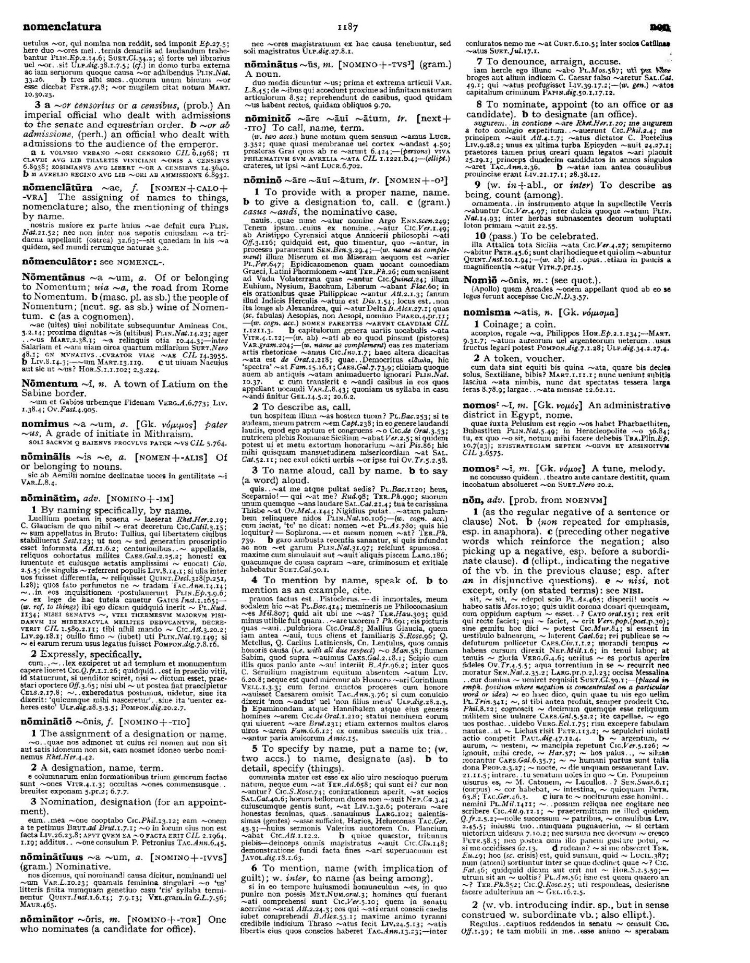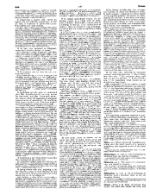
page_listing.tpl
page_subListingDetails.tpl
sub_listingDetails_style1.tpl
sub_listingDetails.title.tpl
nōn not
nōn is a Latin Adverb that primarily means not.
Definitions for nōn
Wheelock's Latin
Adverb
- 1
not
Oxford Latin Dictionary
Adverb
- 1
(as the regular negative of a sentence or clause) Not.
- 2
(modifying a sb.) That which is not (the idea contained in the word), non-.
Sentences with nōn
Latin to English
Vōs eōs (eās, ea) nōn capiētis.Compare You will not capture them.
Nōn sine magnō labōre vēritās inveniētur (inventa est, potest invenīrī).Compare Not without great labor will truth be found (was found, can be found).
Nōn omnēs virī līberī audent sē cum hāc rē pūblicā iungere.Compare Not all free men dare to join themselves with this republic.
Seposito ne Romam, si ita decreveris, non Hispaniensem librum mittamus sed Hispanum.Compare If you decide it should go, I may not transmit to Rome a book, not merely written in Spain, but Spanish.
Tarda tamen nitidae non cedunt sidera luci, et cupit Ausonium luna videre ducem.Compare Yet the slow stars yield not to glowing light, and the moon longs to see Ausonia's chief.
Non iter tantum do, sed via etiam munio, pons facio, commeatus praebeo.Compare I not only granted a passage, but I made roads also, I built bridges, I provided supplies.
Sed tamen non dubito de idem res iterum scribo.Compare Yet nevertheless, I will not hesitate to write a second time on the same subject.
Non fero Romanum nomen sudataque bella et titulos tanto quaesitos sanguine carpi. detrahit invictis legionibus et sua Romae praemia deminuit, qui, quidquid fortiter actum est, adscribit Veneri, palpam victoribus aufert. [Contra orationem Symmachi,II,551)Compare I will not permit the name of Rome, whose wars cost so much toil, and whose glory was purchased at such cost of blood, to be disparaged. He who credits Venus with Rome's great exploits belittles the unconquered legions, destroys Rome's honor, takes away the palm from the victors.
Data sources
Notes
- Definitions
- Frederick M. Wheelock, Wheelock's Latin, 6th ed., rev. Richard A. LaFleur (New York, NY: HarperCollins Publishers, 2005): 6.
- P. G. W. Glare, Oxford Latin Dictionary, Vols. 1-8 (Oxford: Clarendon Press, 1982): 1187.
- Word frequencies
- Christopher Francese, "Latin Core Vocabulary," Dickinson College Commentaries, last modified 2014, http://dcc.dickinson.edu.
- Paul B. Diederich, The Frequency of Latin Words and Their Endings, PhD diss., (Columbia University, 1939).
- Louis Delatte, Suzanne Govaerts, Joseph Denooz, and Etienne Evrard, Dictionnaire fréquentiel et index inverse de la langue latine [Frequency Dictionary and Inverse Index of the Latin Language] (Liège, Belgium: Laboratoire d'analyse statistique des langues anciennes de l'Université de Liège [L.A.S.L.A.], 1981): 119.
Bibliography
Allen, Joseph H. Allen and Greenough's New Latin Grammar for Schools and Colleges: Founded on Comparative Grammar. Edited by James B. Greenough, George L. Kittredge, Albert A. Howard, and Benjamin L. D'Ooge. Boston, MA: Ginn & Company, 1903.
Crystal, David. A Dictionary of Linguistics and Phonetics. 6th ed. Oxford, UK: Blackwell Publishing, 2008.
Delatte, Louis, Suzanne Govaerts, Joseph Denooz, and Etienne Evrard. Dictionnaire fréquentiel et index inverse de la langue latine [Frequency Dictionary and Inverse Index of the Latin Language]. Liège, Belgium: Laboratoire d'analyse statistique des langues anciennes de l'Université de Liège (L.A.S.L.A.), 1981.
Diederich, Paul B. The Frequency of Latin Words and Their Endings. PhD diss., Columbia University, 1939.
Francese, Christopher. "Latin Core Vocabulary." Dickinson College Commentaries. Last modified 2014. http://dcc.dickinson.edu/latin-vocabulary-list.
Gildersleeve, Basil L., and Gonzales Lodge. Gildersleeve's Latin Grammar: Third Edition, Revised, and Enlarged. 3rd ed. London, England: Macmillan and Co., 1903.
Glare, Peter G.W. Oxford Latin Dictionary. Vols. 1-8. Oxford, England: Clarendon Press, 1982.
Krüger, Bernd. "Latin Conjugation Tables." Cactus2000. Accessed May 5, 2023. https://latin.cactus2000.de/index.en.php.
Pierson, Nick. "Sound of Text." Accessed October 26, 2019. https://soundoftext.com.
Wheelock, Frederick M. Wheelock's Latin. 6th ed. Revised by Richard A. LaFleur. New York, NY: HarperCollins Publishers, 2005.
Wiktionary Contributors. "Victionarium." Wikimedia Foundation, Inc. Updated March 18, 2019. https://la.wiktionary.org/wiki/Victionarium:Pagina_prima.
Citation
Chicago (17th ed.)
Allo Contributors. "nōn (adv.) - Latin Word Definition." Allo Latin Dictionary. Last modified . Accessed February 23, 2026. http://ancientlanguages.org/latin/dictionary/non.
Entry created on . Last updated on .








